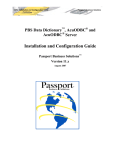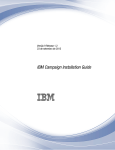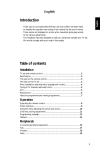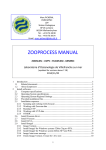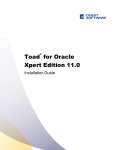Download ODBC Environment Troubleshooting Guide
Transcript
Diagnosis and Troubleshooting DataDirect Connect® Series ODBC Drivers Introduction This paper discusses the diagnostic tools that are available to configure and troubleshoot your ODBC environment and provides a troubleshooting section that discusses some common types of issues that you may experience when using ODBC applications. These tools and techniques apply to both the DataDirect Connect® for ODBC (32-bit) and DataDirect Connect64® for ODBC (64-bit) drivers. Further information on these topics can be found in the product documentation at: http://www.datadirect.com/download/docs/dochome/index.ssp Diagnostic Tools This section discusses the diagnostic tools that are available to you when you are configuring and troubleshooting your ODBC environment for DataDirect Connect for ODBC and DataDirect Connect64 for ODBC. ODBC Trace ODBC tracing allows you to trace calls to ODBC drivers and create a log of the traces. Creating a trace log is particularly useful when you are troubleshooting an issue. To create a trace log, turn on tracing, start the ODBC application, reproduce the issue, stop the application, and turn off tracing. Then, open the log file in a text editor and review the output to help you debug the problem. Be sure to turn off tracing when you are finished reproducing the issue because tracing decreases the performance of your ODBC application. For a more thorough explanation of tracing, see the following DataDirect Knowledgebase document: http://knowledgebase.datadirect.com/kbase.nsf/ SupportLink+Online/2549739SL Enabling Tracing On Windows, you enable tracing by clicking the Start Tracing button on the Tracing tab of the ODBC Administrator. You can also specify the name and location of the trace log on this tab. D I A G N O S I S A N D T R O U B L E S H O O T I N G On UNIX and Linux, the [ODBC] section in the system information file must include the keywords Trace and TraceFile. For example: Trace=1 TraceFile=\home\user\odbctrace.out In this example, tracing is enabled and trace information is logged in a file named odbctrace.out. Although a path to the trace log is shown in the example, it is not required. To disable tracing, set the Trace value to 0. ivtestlib Tool The ivtestlib tool (ddtestlib on DataDirect Connect64 and Connect64 XE for ODBC) is provided to help diagnose configuration problems in the UNIX and Linux environments (such as environment variables not correctly set or missing database client components). This tool is installed in the bin subdirectory in the DataDirect product installation directory, for example, /opt/odbc/bin. The tool attempts to load a specified ODBC driver and prints out all available error information if the load fails. On Solaris, for example, if drivers are installed in /opt/odbc/lib, the command: ivtestlib /opt/odbc/lib/ddivoraxx.so attempts to load the Oracle Wire Protocol driver, where xx is the driver level number. If the driver cannot be loaded, ivtestlib returns an error message explaining why. NOTE: On Solaris, AIX, and Linux, the full path to the driver does not have to be specified for ivtestlib. The HP-UX version of ivtestlib, however, requires the full path. You can use ivtestlib to check the version strings of the ODBC drivers and Driver Manager on UNIX and Linux. Use the following command line: ivtestlib shared_object Loading the 5.1 version of the Oracle Wire Protocol driver: ivtestlib ivora21.so might, for example, return 5.1.0001 (B0001, U0002) Loading the 5.1 version of the Driver Manager on Solaris: ivtestlib libodbc.so might, for example, return 5.1.0001 (U0001) 2 OF 7 D A T A D I R E C T T E C H N O L O G I E S JULY 2005 D I A G N O S I S A N D T R O U B L E S H O O T I N G ODBC Test On Windows, Microsoft® ships along with their ODBC SDK an ODBCenabled application, named ODBC Test, that you can use to test ODBC drivers and the ODBC Driver Manager. ODBC 3.51 includes both ANSI and Unicode-enabled versions of ODBC Test. To use ODBC Test, you must understand the ODBC API, the C language, and SQL. For more information about ODBC Test, see the Microsoft ODBC SDK Guide. demoodbc Application The product is shipped with a small C application, demoodbc, on UNIX and Linux that is useful for: • Executing SELECT * FROM emp, where EMP is a database table (one for each supported database) that is provided with the product. The scripts for building the EMP database tables are in the demo subdirectory in the product installation directory. • Testing database connections. • Creating reproducibles. • Persisting data to an XML data file. Demoodbc is installed in the demo subdirectory in the product installation directory. See the readme in the demo directory for an explanation of how to build and use this application. example Application The product is shipped with a small C application, named example, on Windows and UNIX/Linux that is useful for: • Executing any type of SQL statement • Testing database connections • Testing SQL statements • Verifying your database environment Example is installed in the example subdirectory in the product installation directory. See the readme in the example directory for an explanation of how to build and use this application. D A T A D I R E C T T E C H N O L O G I E S JULY 2005 3 OF 7 D I A G N O S I S A N D T R O U B L E S H O O T I N G Other Tools The DataDirect Technologies Support Web site provides other diagnostic tools that you can download to assist you with troubleshooting. These tools are not shipped with the product. See the DataDirect Web page: http://www.datadirect.com/support/downloads/tools/index.ssp DataDirect Technologies also provides a knowledge base that is useful in troubleshooting problems. See the DataDirect Knowledgebase page: http://knowledgebase.datadirect.com/ Troubleshooting When you are having an issue while using a DataDirect Connect Series ODBC product, the first thing to do is determine the type of issue that you are seeing: • Setup/connection • Interoperability (ODBC application, ODBC driver, ODBC Driver Manager, and/or data source) This section describes these two types of issues, provides some typical causes of the issues and, in some cases, explains possible actions you can take to resolve the issues. Setup/Connection Issues You are experiencing a setup/connection issue if you are encountering an error or hang while you are trying to make a database connection with the ODBC driver or are trying to configure the ODBC driver. Some common errors that are returned by the ODBC driver if you are experiencing a setup/connection issue are: 4 OF 7 • Specified driver could not be loaded • Data source name not found and no default driver specified • Cannot open share library: libodbc.sl • ORA-12203: Unable to connect to destination • ORA-01017: invalid username/password; logon denied D A T A D I R E C T T E C H N O L O G I E S JULY 2005 D I A G N O S I S A N D T R O U B L E S H O O T I N G Troubleshooting the Issue Some common reasons that setup/connection issues occur are: • The library path environment variable is not set correctly for the ODBC drivers: o PATH on Windows o LD_LIBRARY_PATH on Solaris and Linux o SHLIB_PATH on HP-UX (32-bit) o LD_LIBRARY_PATH HP-UX (64-bit) o LIBPATH on AIX • The ODBCINI environment variable is not set correctly for the ODBC drivers on UNIX and Linux. • The ODBC driver’s connection attributes are not set correctly in the system information file (odbc.ini in most cases) on UNIX and Linux. For example, the host name or port number are not correctly configured. See each individual driver chapter in the DataDirect product documentation for a list of connection string attributes that are required for each driver to connect properly to the underlying database. • The database and/or listener are not started. For UNIX and Linux users, see ivtestlib Tool in the Diagnostic Tools section. Interoperability Issues Interoperability issues occur when you have a working ODBC application in place. In these cases, the issue occurs in one or more of the following components of ODBC—the ODBC application, ODBC driver, ODBC Driver Manager, and/or data source. Some common examples of what you might experience if you have an interoperability issue are: • SQL statements fail to execute • Data is returned/updated/deleted/inserted incorrectly • A hang or core dump Troubleshooting the Issue When you experience an interoperability issue, you must isolate the component in which the issue is occurring. Is it an ODBC application, an ODBC driver, an ODBC Driver Manager, or a data source issue? D A T A D I R E C T T E C H N O L O G I E S JULY 2005 5 OF 7 D I A G N O S I S A N D T R O U B L E S H O O T I N G The first step First, test to see if your ODBC application is the source of the problem. To do this, replace your ODBC application with a smaller, simpler application. If you can reproduce the issue using a simpler ODBC application, then you know your ODBC application is not the cause of the issue. On Windows, you can use ODBC Test, which is part of the Microsoft ODBC SDK, or the example application that is shipped with your DataDirect product. On UNIX and Linux, you can use the example application. See example Application in the Diagnostic Tools section The second step Second, test to see if the data source is the source of the problem. To do this, use the native database tools that are provided by your database vendor. The third step If you find that neither the ODBC application nor the data source is the source of your problem, you then can troubleshoot the ODBC driver and the ODBC Driver Manager. In this case, we recommend that you create an ODBC trace log so that you can provide this to DataDirect technical support. See ODBC Trace in the Diagnostic Tools section for details. Summary DataDirect Technologies provides a number of diagnostic tools that are available to configure and troubleshoot your ODBC environment, and provides documentation that discusses some common types of issues that you may experience when using ODBC applications. This paper gives an overview of these tools and issues, but further information on these topics can be found in the product documentation at: http://www.datadirect.com/download/docs/dochome/index.ssp We welcome your feedback! Please send any comments concerning documentation, including suggestions for other topics that you would like to see, to: [email protected] 6 OF 7 D A T A D I R E C T T E C H N O L O G I E S JULY 2005 D I A G N O S I S A N D T R O U B L E S H O O T I N G FOR MORE INFORMATION 800-876-3101 Worldwide Sales Belgium (French) ..............0800 12 045 Belgium (Dutch)................0800 12 046 France .............................0800 911 454 Germany .....................0800 181 78 76 Japan ..............................0120.20.9613 Netherlands ..................0800 022 0524 United Kingdom ..........0800 169 19 07 United States..................800 876 3101 Copyright © 2005 DataDirect Technologies Corp. All rights reserved. DataDirect Connect is a registered trademark of DataDirect Technologies Corp. in the United States and other countries. DataDirect XQuery is a trademark of DataDirect Technologies Corp. in the U.S. and other countries. Java and all Java based trademarks and logos are trademarks or registered trademarks of Sun Microsystems, Inc. in the United States and other countries. Other company or product names mentioned herein may be trademarks or registered trademarks of their respective companies. D A T A D I R E C T T E C H N O L O G I E S DataDirect Technologies is focused on standards-based data connectivity, enabling software developers to quickly develop and deploy business applications across all major databases and platforms. DataDirect Technologies offers the most comprehensive, proven line of data connectivity components available anywhere. Developers worldwide at more than 250 leading independent software vendors and thousands of corporate IT departments rely on DataDirect® products to connect their applications to an unparalleled range of data sources using standards-based interfaces such as ODBC, JDBC™ and ADO.NET. Developers also depend on DataDirect to radically simplify complex data integration projects using XML products based on the emerging XQuery and XQJ standards. DataDirect Technologies is an operating company of Progress Software Corporation (Nasdaq: PRGS), a US$300+ million global software industry leader. Headquartered in Bedford, Mass., DataDirect Technologies can be reached on the Web at http://www.datadirect.com or by phone at +1-800-876-3101. JULY 2005 7 OF 7








